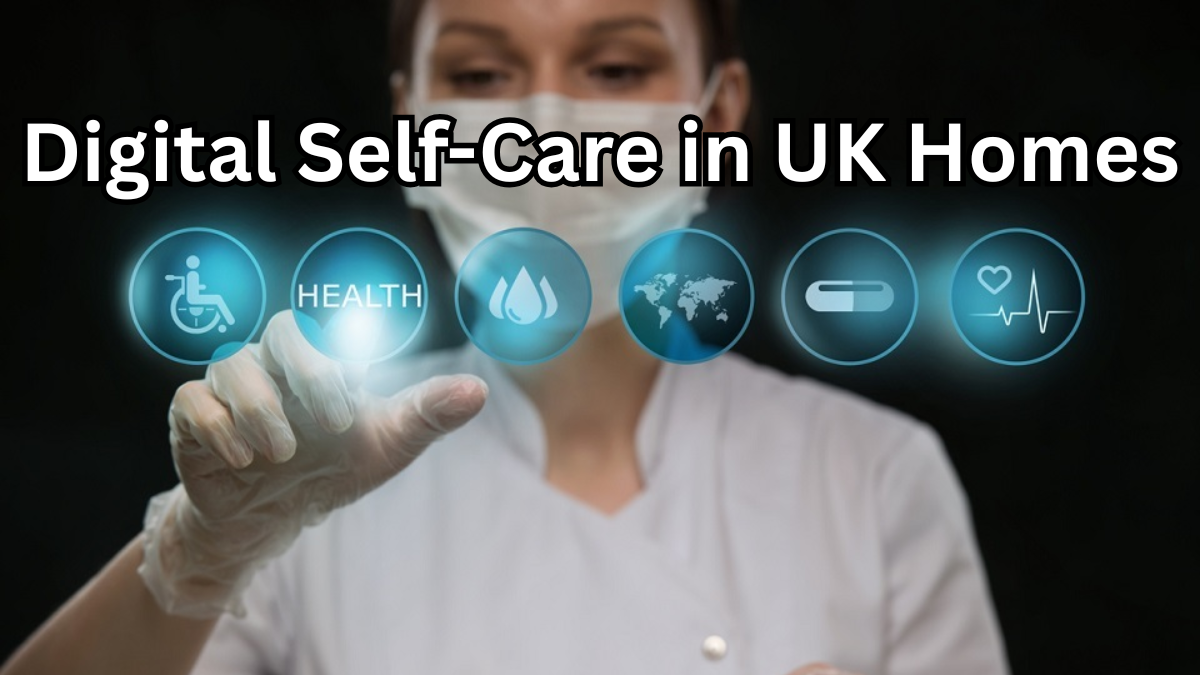In 2025, self-care has found a new home—literally. Across the UK, more households are relying on technology to maintain their mental, emotional, and physical health. As people increasingly turn to their smartphones and smart devices for support, a growing culture of Digital Self-Care in UK Homes is taking shape.
This trend is more than just a tech fad. It reflects a deeper, more intentional shift toward sustainable, at-home wellness habits. Whether it’s improving sleep quality, reducing anxiety, or supporting fitness goals, digital wellness tools are transforming how people care for themselves in their everyday lives.

Why the UK Is Embracing Digital Self-Care at Home
The rise of wellness apps across UK households is being driven by a unique combination of cultural, technological, and lifestyle factors. As lives become more digitally connected and health consciousness grows, self-care is no longer confined to gyms or clinics.
Key Drivers of the Shift
-
Accessibility: Apps are available 24/7, making wellness support convenient and on-demand.
-
Affordability: Many wellness apps offer free versions or low-cost subscriptions.
-
Flexibility: Users can customise routines to match their schedules and lifestyles.
-
Pandemic Legacy: COVID-19 accelerated the need for remote health solutions and digital mental health tools.
-
Focus on Work-Life Balance: As hybrid work continues, there’s an increasing desire to separate work stress from home life using mindfulness tools.
With all these factors at play, it’s no surprise that Digital Self-Care in UK Homes is becoming the foundation for holistic living.
Popular Categories of Wellness Apps in the UK
As wellness goals diversify, so do the types of apps people turn to. Here’s a look at some of the most widely used app categories in 2025.
| Category | Purpose | Popular Apps |
|---|---|---|
| Sleep & Relaxation | Improve sleep quality and relaxation routines | Calm, Sleep Cycle, Headspace |
| Mental Health & Therapy | Offer mood tracking, therapy chatbots, CBT tools | Woebot, BetterHelp, Moodnotes |
| Fitness & Movement | Guide home workouts and track fitness goals | Nike Training Club, Peloton, FitOn |
| Nutrition & Meal Planning | Help with diet tracking and healthy eating | MyFitnessPal, Yazio, Lifesum |
| Meditation & Mindfulness | Enhance mental clarity and reduce stress | Insight Timer, Breathwrk, Aura |
These tools are now essential parts of many UK households’ daily routines, helping to create structure and intention around well-being.
Home Wellness & Sleep Focus: Why Sleep Is the New Status Symbol
In today’s fast-paced world, getting a good night’s sleep is one of the most valued forms of self-care. That’s why so many wellness tools now include a Home Wellness & Sleep Focus, with technologies designed to support better sleep hygiene.
Key Trends in Sleep-Focused Digital Tools
-
Smart sleep tracking: Devices like Fitbit, Apple Watch, and Oura Ring provide deep sleep analytics and insights.
-
Soundscapes and white noise: Many apps include sound features to aid falling asleep and improve sleep continuity.
-
Digital wind-down routines: Apps now include guided meditations and sleep stories to ease nighttime anxiety.
-
Light control: Smart bulbs are syncing with sleep cycles to mimic sunrise/sunset and support melatonin production.
This growing interest in digital sleep tools reflects how people are prioritising quality rest as part of their broader self-care routines at home.
How UK Families Are Personalising Self-Care in Everyday Life
One of the most powerful things about Digital Self-Care in UK Homes is how personal and adaptable it has become. No matter your age, lifestyle, or wellness goal, there’s likely an app that can help you feel better—on your own terms.
Real-Life Examples of Everyday Use
-
Parents and children doing bedtime meditations together using Headspace for Kids
-
Remote workers using apps to schedule stretch breaks or midday breathing sessions
-
Older adults tracking their mood and sleep while using gentle fitness apps for mobility
-
Teenagers journaling digitally or tracking anxiety to support mental health
These personalised routines make self-care more approachable, achievable, and even enjoyable.
The Future of Digital Wellness in UK Homes
As technology advances, the tools supporting home wellness will become even more intelligent and personalised. AI-based coaching, wearable integration, and emotional health forecasting are just a few innovations on the horizon.
We can expect further development in:
-
Voice-assisted wellness via Alexa and Google Home
-
Holistic health dashboards that integrate fitness, diet, sleep, and mental wellness data
-
Family-focused wellness plans where multiple members track and improve health together
Ultimately, the home is becoming the new wellness hub—and that change is being powered by smart, accessible apps with a strong Home Wellness & Sleep Focus.
FAQs
What is digital self-care, and how is it different from traditional self-care?
Digital self-care refers to using technology like mobile apps, wearables, and smart home devices to manage mental and physical health. Unlike traditional self-care, it offers on-demand support and personalised tools you can use anytime, anywhere—especially in the comfort of your home.
Are wellness apps reliable for improving sleep and mental health?
Yes, many wellness apps are backed by science and developed with healthcare professionals. Apps that offer cognitive behavioural therapy (CBT), sleep coaching, and mindfulness training have shown real benefits when used regularly.
Is digital self-care suitable for people who aren’t tech-savvy?
Absolutely. Many apps are designed to be user-friendly with simple interfaces, audio guidance, and easy tracking. There are even apps tailored for older users or those new to digital tools.
Can families use these apps together?
Yes, and many do. Apps like Calm, Headspace, and Fitbit offer family features or kid-friendly modes, allowing everyone in the household to participate in wellness routines together.
Final Thoughts
Digital self-care isn’t just a trend—it’s a lifestyle transformation. With so many options available, individuals and families across the UK are creating healthier, more mindful homes powered by technology. By adopting a Home Wellness & Sleep Focus, they’re not only improving sleep or reducing stress—they’re building sustainable wellness habits that can last a lifetime.
Click here to learn more